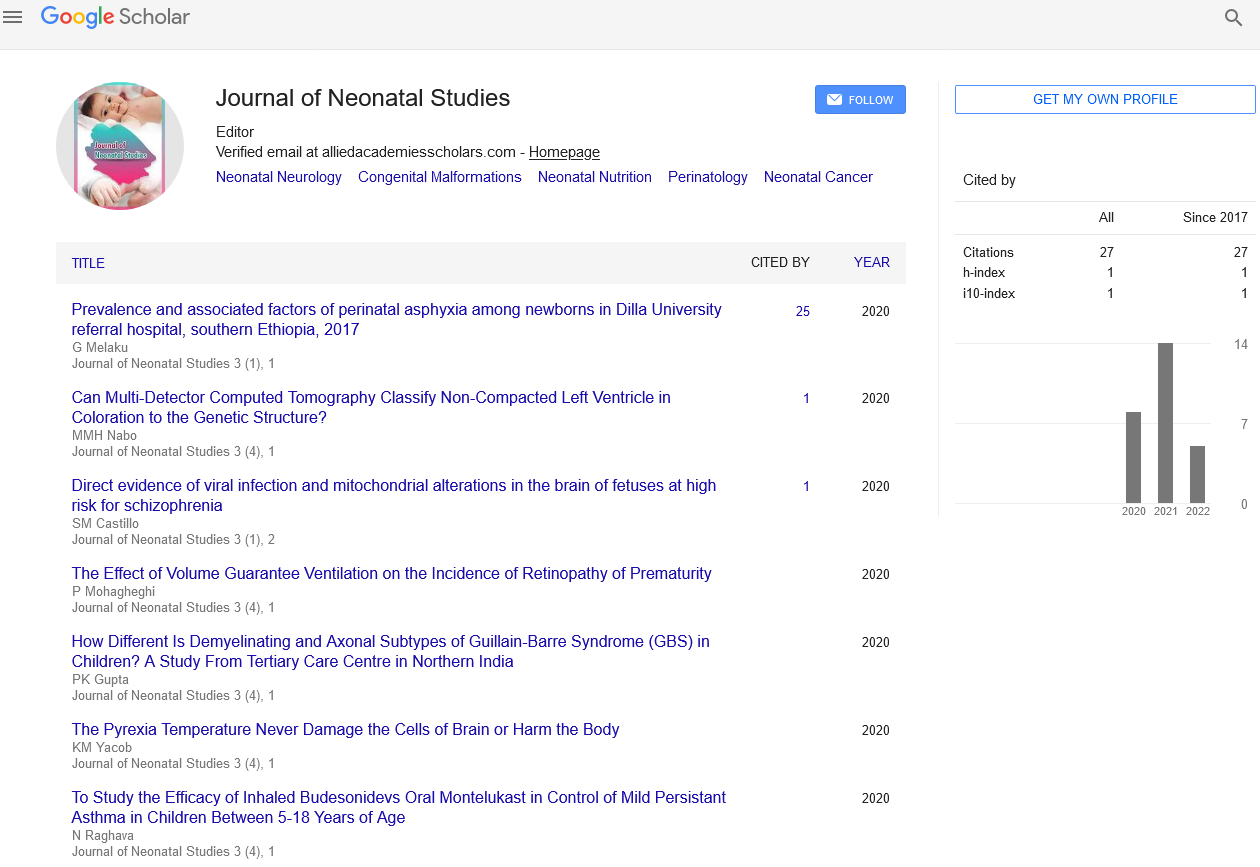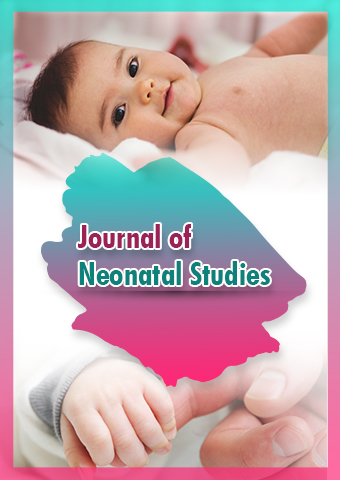Perspective - Journal of Neonatal Studies (2024) Volume 7, Issue 5
Neonatologists Role in the Delivery and Immediate Care of Newborns
- Corresponding Author:
- Keneilwe Goitsemedi
Department of Neonatology Medicine, University of Botswana, School of Medicine, Botswana
E-mail: Keneilwe.Goitsemedi@ub.bw.edu
Received: 02-Sep-2024, Manuscript No. JNS-24-150529; Editor assigned: 04-Sep-2024, PreQC No. JNS-24-150529 (PQ); Reviewed: 18-Sep-2024, QC No. JNS-24-150529; Revised: 23-Oct-2024, Manuscript No. JNS-24-150529 (R); Published: 30-Oct-2024, DOI: 10.37532/JNS.2024.7(5).264-266
Introduction
Neonatologists play a pivotal role in the delivery and immediate care of newborns, particularly those who are at risk of complications. Their expertise is crucial in ensuring that high-risk infants receive the specialized care they need from the moment they are born. This article delves into the various responsibilities and contributions of neonatologists during the delivery process, highlighting their importance in neonatal care.
Description
The role of a neonatologist
A neonatologist is a pediatrician with advanced training in the care of newborns, especially those who are premature, have birth defects, or are critically ill. These specialists are equipped to handle complex and high-risk situations, providing essential support to ensure the best outcomes for newborns.
Prenatal consultation and planning
One of the key responsibilities of a neonatologist begins even before the baby is born. Prenatal consultation is an integral part of their role, particularly for pregnancies identified as high-risk. This involves:
Risk assessment: Evaluating the mother’s medical history, pregnancy complications, and any potential risk factors that could affect the baby. This may include maternal conditions such as diabetes, hypertension, or infections, as well as fetal anomalies detected through ultrasound or genetic testing.
Counseling and education: Providing parents with information about potential risks and outcomes, what to expect during delivery, and the possible need for specialized care after birth. This helps prepare parents for various scenarios and reduces anxiety by giving them a clear understanding of the plan of action.
Multidisciplinary collaboration: Coordinating with obstetricians, maternal-fetal medicine specialists, and other healthcare providers to develop a comprehensive delivery plan. This ensures that all necessary resources and personnel are in place to address any complications that may arise during delivery.
Presence during delivery
Neonatologists are often present in the delivery room for high-risk births to provide immediate care to the newborn. Their responsibilities during delivery include:
Stabilization of the newborn: Assessing the newborn’s condition immediately after birth and providing necessary interventions. This may involve resuscitation, clearing the airway, providing oxygen, or initiating mechanical ventilation if the baby has difficulty breathing.
Monitoring vital signs: Continuously monitoring the newborn’s heart rate, breathing, and oxygen levels to ensure they are stable. This allows for the early detection and management of any complications.
Performing emergency procedures: In cases where the newborn requires immediate medical intervention, neonatologists are skilled in performing emergency procedures such as intubation, insertion of intravenous lines, and administering medications.
Immediate post-delivery care
After the initial stabilization, neonatologists provide ongoing care to ensure the newborn’s well-being. This includes:
Thermoregulation: Maintaining the newborn’s body temperature is critical, especially for premature infants who are at risk of hypothermia. Neonatologists use incubators or radiant warmers to regulate the baby’s temperature.
Nutritional support: Determining the appropriate method of feeding, whether through breastfeeding, formula feeding, or intravenous nutrition, and ensuring the baby receives adequate nutrition to support growth and development.
Monitoring for complications: Keeping a close watch for signs of complications such as jaundice, infections, or metabolic disorders, and providing prompt treatment as needed.
Neonatal Intensive Care Unit (NICU)
For babies who require specialized medical care, the Neonatal Intensive Care Unit (NICU) is the critical environment where neonatologists provide intensive monitoring and treatment. Responsibilities in the NICU include:
Comprehensive care: Providing round-the-clock care for critically ill or premature infants. This involves managing respiratory support, administering medications, and monitoring vital signs and laboratory results.
Multidisciplinary team coordination: Working closely with a team of healthcare professionals, including nurses, respiratory therapists, nutritionists, and pediatric specialists, to ensure comprehensive care for the newborn.
Parental support and education: Supporting parents through the emotionally challenging experience of having a baby in the NICU. This includes providing updates on the baby’s condition, involving parents in care decisions, and offering education on how to care for their baby after discharge.
Long-term follow-up and care
The role of a neonatologist extends beyond the immediate post-delivery period. Long-term follow-up and care are crucial for ensuring the continued health and development of the child. This involves:
Developmental assessments: Monitoring the baby’s growth and development, including motor skills, cognitive function, and behavioral milestones, to identify any delays or concerns early.
Managing chronic conditions: Providing ongoing care for any chronic conditions or complications that may arise from prematurity or other neonatal issues, such as chronic lung disease, cerebral palsy, or feeding difficulties.
Coordination with pediatricians: Collaborating with the child’s primary pediatrician and other specialists to ensure a smooth transition from NICU care to regular pediatric follow-up. This ensures continuity of care and addresses any ongoing medical needs.
Case studies and success stories
Several case studies highlight the critical role of neonatologists in ensuring positive outcomes for high-risk newborns:
Case study 1: A baby born at 26 weeks’ gestation required immediate resuscitation and intensive respiratory support. The neonatologist’s expertise in managing preterm infants was crucial in stabilizing the baby and providing ongoing care in the NICU. With multidisciplinary support, the baby eventually went home healthy and continued to receive developmental follow-up care.
Case study 2: A newborn with a congenital heart defect was identified through prenatal screening. The neonatologist coordinated with pediatric cardiologists and surgeons to ensure a seamless transition from delivery to surgical intervention. The early involvement of the neonatologist and the comprehensive care provided in the NICU were instrumental in the baby’s successful recovery.
The evolving role of neonatologists
Advancements in neonatal medicine and technology continue to expand the role of neonatologists. Emerging areas of focus include:
Telemedicine: Utilizing telemedicine to provide expert consultations and support to remote or underserved areas, improving access to specialized neonatal care.
Genetic and genomic medicine: Integrating genetic and genomic information into neonatal care to better understand the underlying causes of certain conditions and develop targeted treatment plans.
Research and innovation: Participating in research to advance the understanding of neonatal conditions and develop new treatments and interventions that improve outcomes for newborns.
Conclusion
Neonatologists play a vital role in the delivery and care of newborns, particularly those who are premature or critically ill. Their expertise in prenatal consultation, immediate post-delivery care, and long-term follow-up is essential for ensuring the best possible outcomes for high-risk infants. As the field of neonatology continues to evolve, neonatologists remain at the forefront of advancing neonatal care and improving the health and well-being of newborns worldwide.

